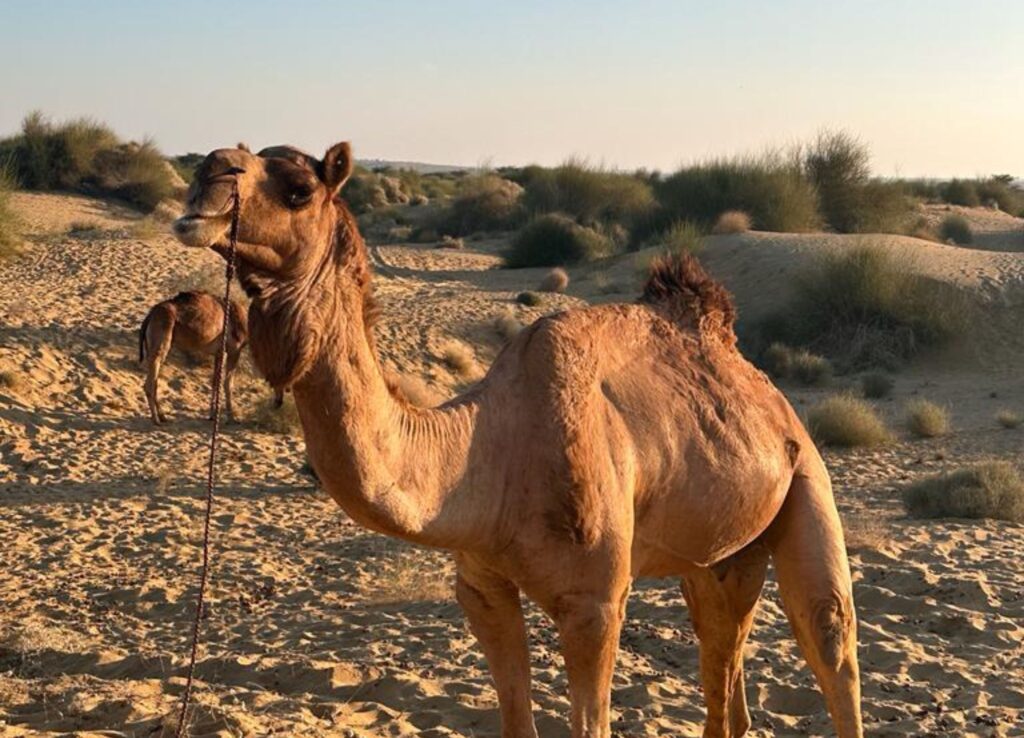Introduction to Indian Veggie Food
Welcome to the world of Indian cuisine, a symphony of flavors, colors, and aromas that has fascinated taste buds for centuries.
India, with its cultural and religious diversity, has long embraced the concept of vegetarianism. Influenced by Hindu and Jain traditions, a significant portion of Indian cuisine revolves around vibrant and flavorful vegetarian dishes.
One cannot truly understand Indian food without a visit to the bustling street markets. Amidst the chaotic symphony of honking horns and vibrant colors, street vendors sell culinary wonders, from the spicy allure of chaat to the sweet spiral of jalebi. These street-side delicacies tell stories, passed down through generations, reflecting the spirit of the local communities.
In case you are interested in traveling to India, do not forget to check out our 4-weeks India guide as well as the 2-weeks North India guide.
Enough introduction, let’s dig deeper into our Indian Veggie Food Guide!
Don’t want to travel to India on your own and do a fully guided tour instead? Check out Tourhub, a platform offering guided tours all around the world. Do not forget to use my code SALLY1GURU for a 5% discount.
Regional Diversity of Indian Veggie Food
North Indian Cuisine
In the northern reaches of the subcontinent, the Mughals left an indelible mark on the cuisine. Picture the grandeur of the Mughal courts reflected in slow-cooked biryanis, fragrant kebabs, and rich, creamy curries. Here, succulent meats and aromatic spices take center stage, and tandoor ovens create wonders like the iconic naan and crisp tandoori rotis.
South Indian Cuisine
Traveling south, the landscape transforms, and so does the culinary tale. The rich tapestry of South Indian cuisine is woven with coconut-infused curries, tangy tamarind-based dishes, and an abundance of aromatic spices. From the fiery Chettinad cuisine to the comfort of dosas and idlis, every bite echoes the warmth of South Indian hospitality.
East Indian Cuisine
The eastern shores embrace a symphony of flavors where sweets are not just desserts but an integral part of daily life. Bengali sweets, adorned with the richness of milk and the allure of jaggery, are an art form. On the coastal fringes, seafood takes the spotlight, with dishes like the iconic Bengali fish curry and Odia seafood delights.
West Indian Cuisine
The west is a culinary carnival that celebrates the joy of street food and thalis. The vibrant street markets of Mumbai offer the spicy delights of pav bhaji and vada pav. Move further inland, and you’re greeted with the aromatic Gujarati thalis, showcasing the diversity of vegetarian dishes, from dhokla to the sweet undertones of shrikhand.
Central Indian Cuisine
As we venture into the heart of the country, a culinary melting pot awaits. Central India is a canvas where influences from neighboring regions converge. Rich, hearty dishes like poha, dal bafla, and the indulgent sweets of Malwa reflect the essence of Central Indian gastronomy.
Don’t know where to look for cheap flights? WayAway is a flight comparison tool that helps you to find unbeatable deals worldwide. Get the iOS app or android app here or check out the search function down below.
Essential Spices and Herbs of Indian Veggie Food
In the wonderful world of Indian cooking, spices and herbs aren’t just seasonings; they’re like the conductors of a flavor orchestra, creating a tasty dance on your taste buds. These special ingredients, chosen and mixed with care, are the key players in making every dish extra delicious, turning everyday meals into something really special.
Join us as we explore the basic spices and herbs that make Indian vegetarian cooking so flavorful:
Cumin: With its warm and earthy notes, cumin is a cornerstone of Indian cuisine, imparting a distinctive aroma and depth of flavor to dishes like dal, curries, and rice.
Coriander: Coriander, in its dual role as both spice and herb, lends a fresh, citrusy fragrance to dishes and balances the robustness of other spices in masalas and chutneys.
Turmeric: Known for its vibrant golden hue, turmeric adds warmth and a subtle earthiness to Indian dishes, while also boasting anti-inflammatory properties.
Cardamom: This fragrant spice, whether in its green or black variety, elevates both sweet and savory dishes with its floral, slightly sweet flavor, often found in desserts and chai.
Cinnamon: The sweet and woody essence of cinnamon imparts a delightful warmth to dishes like biryanis, desserts, and chai, creating a harmonious blend of flavors.
Mustard Seeds: When they are tempered in hot oil, release a nutty aroma and add a unique pungency to pickles, curries, and various regional spice blends.
Cloves: Intensely aromatic, cloves contribute a sweet and spicy flavor profile, making them a key player in biryanis, masalas, and desserts.
Fenugreek: Fenugreek leaves and seeds add a slightly bitter note to dishes, balancing sweetness and enhancing the flavors in a range of curries and pickles.
Chilies: From the fiery red chili powder to the fresh green chilies, this spice spectrum adds the quintessential kick to Indian dishes, from curries to chutneys.
Curry Leaves: They are aromatic and slightly citrusy, are a staple in South Indian cooking, enhancing the flavors of dals, rasams, and coconut-based dishes.
These spices and herbs, each with its own unique character, come together like a lively mix that shapes the taste of Indian food. In the following picture you see some basic spices including salt, chili powder, cumin, cardamom, coriander, curry leaves & many more.
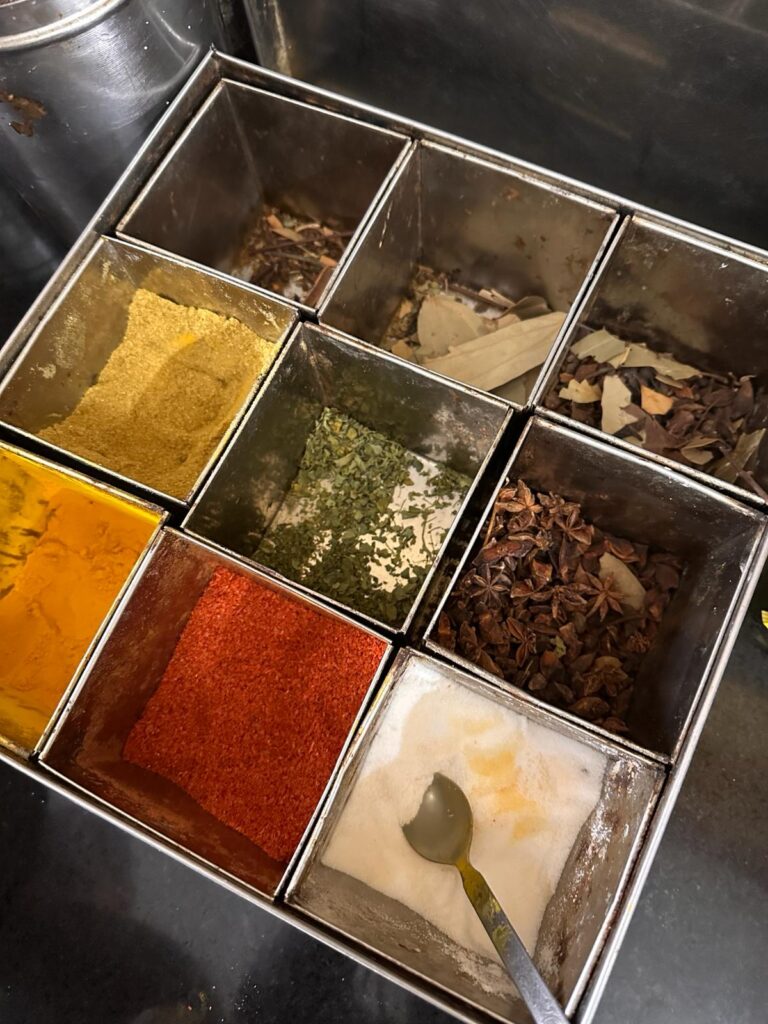
Breakfast
India embraces breakfast as a celebration of diverse flavors and regional culinary traditions. Unlike the simplicity of a continental breakfast, the Indian morning meal features both savory and sweet dishes, thus making it very variable.
From the hearty parathas stuffed with spiced potatoes to the light and fluffy idlis served with coconut chutney, each dish bears the distinct stamp of local culture and taste. What sets Indian breakfast apart is the usage of spices such as mustard seeds in South India or garam masala in North India.
Masala Dosa: A South Indian delicacy consisting of a crispy rice and lentil crepe filled with a spiced potato mixture.
Poha: Flattened rice cooked with mustard seeds, turmeric, and an assortment of vegetables, creating a light and flavorful breakfast dish.
Idli: Steamed rice and urad dal batter cakes, soft and spongy in texture, typically served with coconut chutney and sambar.
Upma: A savory porridge made from semolina, tempered with mustard seeds, curry leaves, and vegetables, offering a wholesome and quick breakfast option.
Misal Pav: A Maharashtrian breakfast delight featuring spicy sprouted lentil curry, garnished with onions, coriander, and served with pav (bread rolls).
Aloo Puri: Deep-fried whole wheat bread paired with a spiced potato curry, creating a hearty and satisfying North Indian breakfast.
Chole Bhature: Fried bread paired with a flavorful chickpea curry, a popular North Indian dish known for its rich and indulgent taste.
Uttapam: Thick rice and urad dal pancake topped with vegetables, creating a savory and slightly tangy breakfast item.
Medu Vada: Deep-fried lentil fritters with a crispy exterior and a soft interior, often served with coconut chutney and sambar, originating from South India.
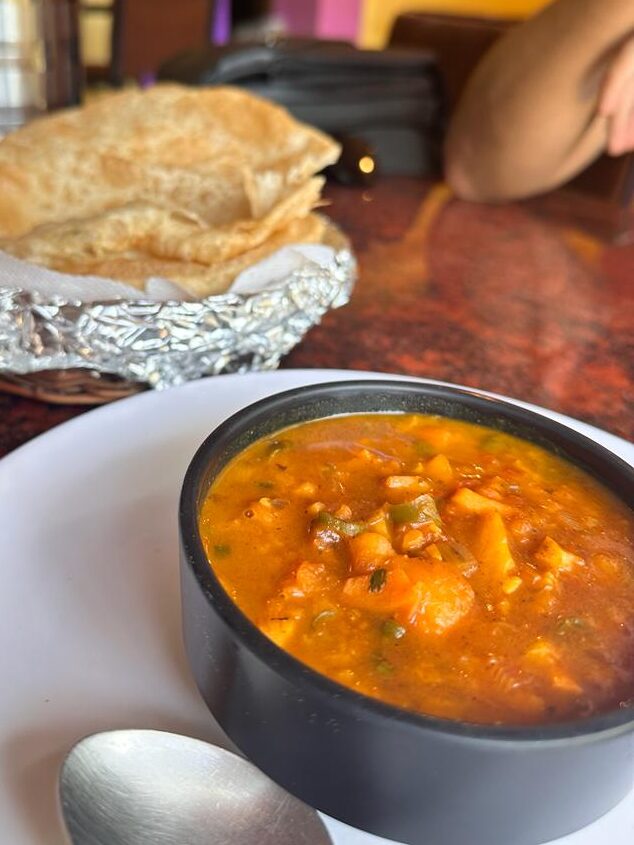
Appetizers
In Indian cuisine, appetizers are like the opening act before a delicious show. Inspired by lively street food, these starters include crispy samosas, grilled paneer tikka, and stuffed bell peppers.
With spices and tasty chutneys on the side, Indian appetizers promise a flavorful journey that gets your taste buds ready for a diverse and delightful feast.
Samosa: Triangular pastry filled with spiced potatoes, peas, and sometimes lentils, deep-fried until golden and crispy.
Paneer Tikka: Cubes of Indian cottage cheese marinated in a spiced yogurt mixture and grilled or baked to perfection.
Pakora: Vegetables like onion, spinach, or cauliflower coated in chickpea flour batter and deep-fried, resulting in crispy and flavorful fritters.
Aloo Chaat: Cubes of boiled potatoes tossed with spices, chutneys, and garnishes like onions and coriander, creating a tangy and spicy snack.
Dhokla: Steamed fermented rice and chickpea flour cakes, tempered with mustard seeds and curry leaves, often served with mint chutney.
Bhel Puri: A popular street food comprising puffed rice, sev, chopped vegetables, and chutneys, offering a sweet, spicy, and tangy flavor combination.
Papri Chaat: Crispy fried dough wafers (papri) topped with boiled potatoes, yogurt, chutneys, and chaat masala, creating a delightful melange of flavors and textures.
Hara Bhara Kebab: Vegetarian kebabs made from spinach, peas, and potatoes, spiced with green chilies and coriander, and shallow-fried until golden.
Vegetable Spring Rolls: Thin pastry sheets filled with a mixture of julienned vegetables, rolled, and deep-fried until crispy.
Vegetable Cutlet: Mashed potatoes and mixed vegetables formed into patties, coated in breadcrumbs, and shallow-fried, creating a crispy and savory appetizer.
Dahi vada: Deep-fried lentil dumplings soaked in yogurt and topped with chutneys and spices
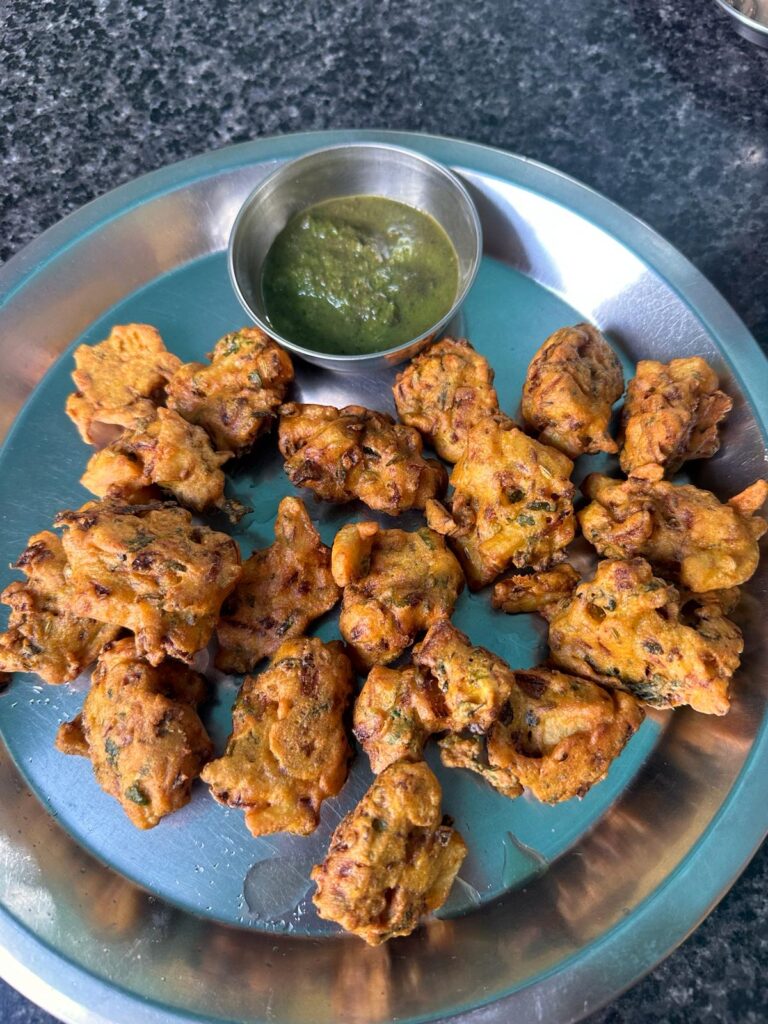
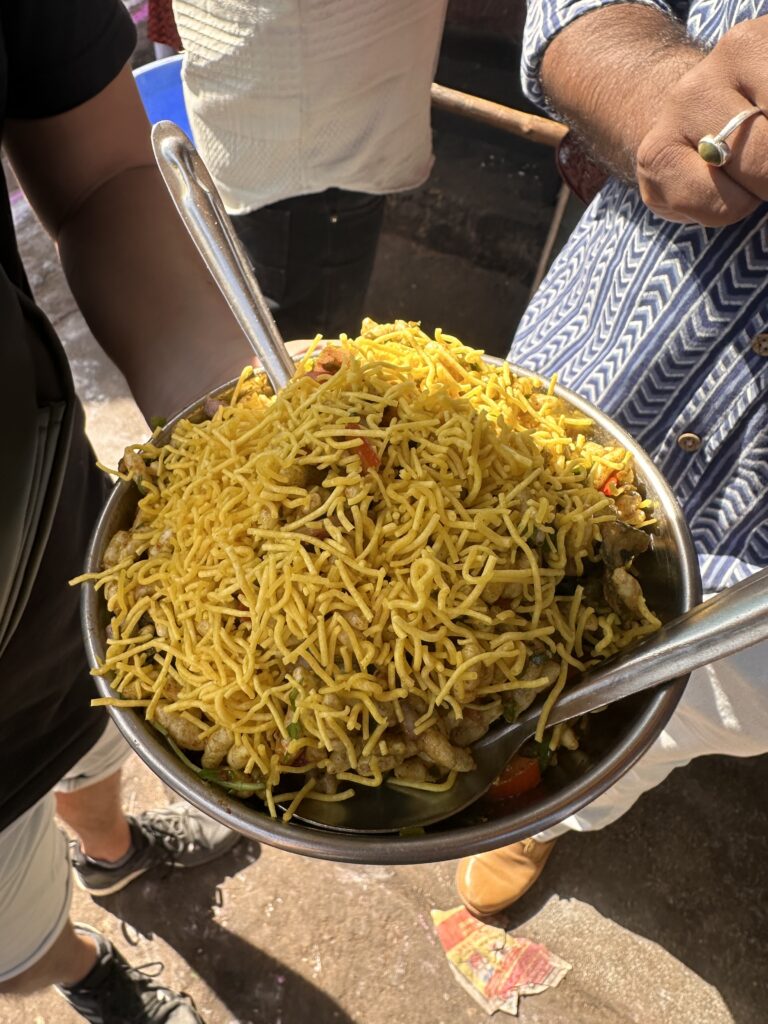
Bread
In the realm of Indian food, bread can be eaten in several forms, each offering a unique texture and taste. Chapatis are a daily staple, perfect for scooping up dal or wrapping around curries. Stuffed parathas, on the other hand, boast a delightful filling of spiced potatoes, paneer, or radishes, making them a meal in themselves.
Accompanying the feast, fluffy naans, often baked in a tandoor, pair exquisitely with rich gravies, while crispy puris provide a delightful crunch when enjoyed with chana masala or aloo subzi.
Naan: Soft and fluffy leavened bread, typically cooked in a tandoor (clay oven), and often brushed with ghee or butter.
Roti/Chapati: Unleavened whole wheat flatbread, a staple in many Indian households, cooked on a griddle and served with various curries and side dishes.
Paratha: Flaky and layered whole wheat flatbread, often stuffed with spiced potatoes, paneer, or minced meat, and pan-fried until golden.
Bhatura: Deep-fried puffed bread made from fermented dough.
Puri: Small, deep-fried unleavened bread, often served with potato curry or a variety of other accompaniments.
Kulcha: Leavened bread, similar to naan, but typically stuffed with ingredients and baked in a tandoor.
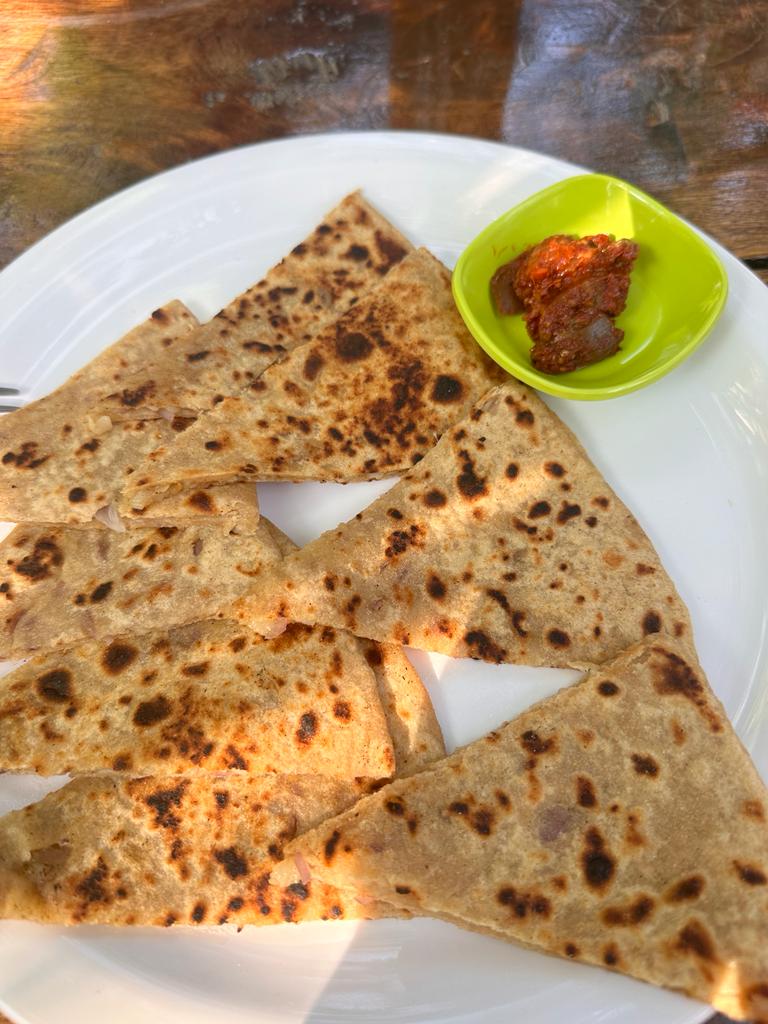
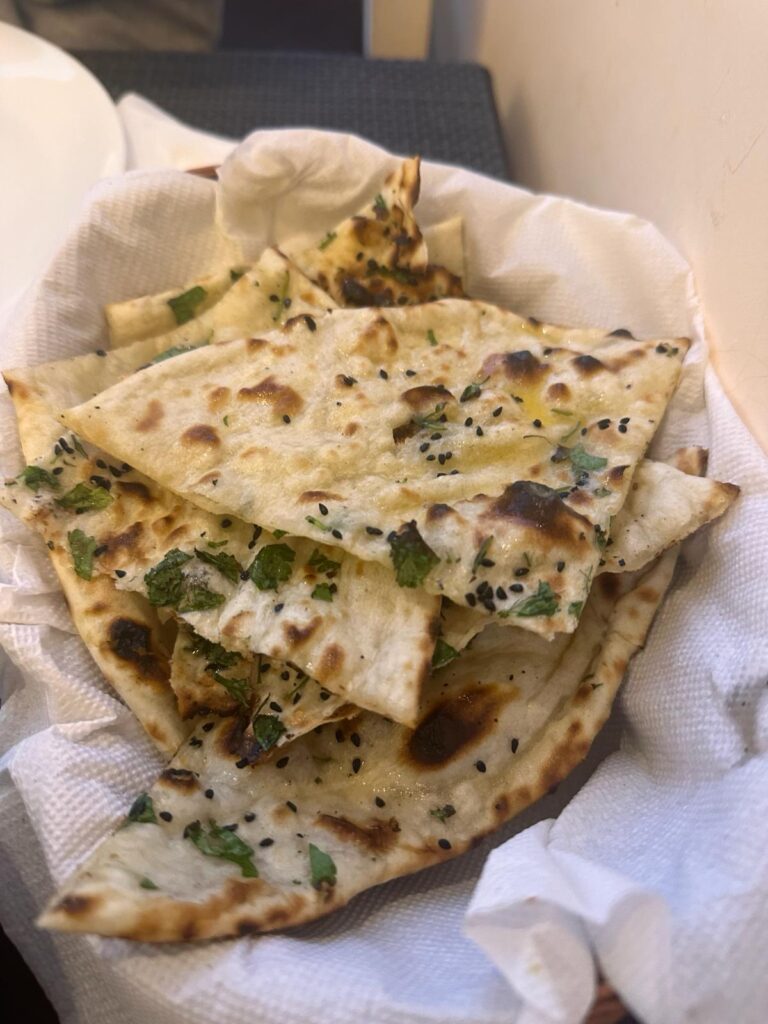
Main dishes – Indian Veggie Food
Paneer – Indian cottage cheese
Paneer, the special Indian cheese, can be enjoyed in lots of delicious dishes. You can have it grilled in paneer tikka, mixed in spicy mattar paneer, or stuffed in soft paneer parathas. It soaks up all the tasty spices, making it perfect for savory curries or even sweet desserts, offering something yummy for everyone to enjoy.
- Mattar Paneer: A classic North Indian dish consisting of paneer and green peas cooked in a spiced tomato-based curry.
- Paneer Pasanda: A luxurious vegetarian dish where paneer slices are stuffed with a rich mixture of nuts and spices, dipped in a creamy cashew-based gravy.
- Palak Paneer: A spinach curry featuring paneer for a creamy and flavorful dish.
- Shahi Paneer: Indulge in the richness of royal paneer curry bathed in a velvety and creamy sauce.
- Paneer Tikka Masala: Savory marinated and grilled paneer immersed in a spiced tomato-based gravy for a delectable experience.
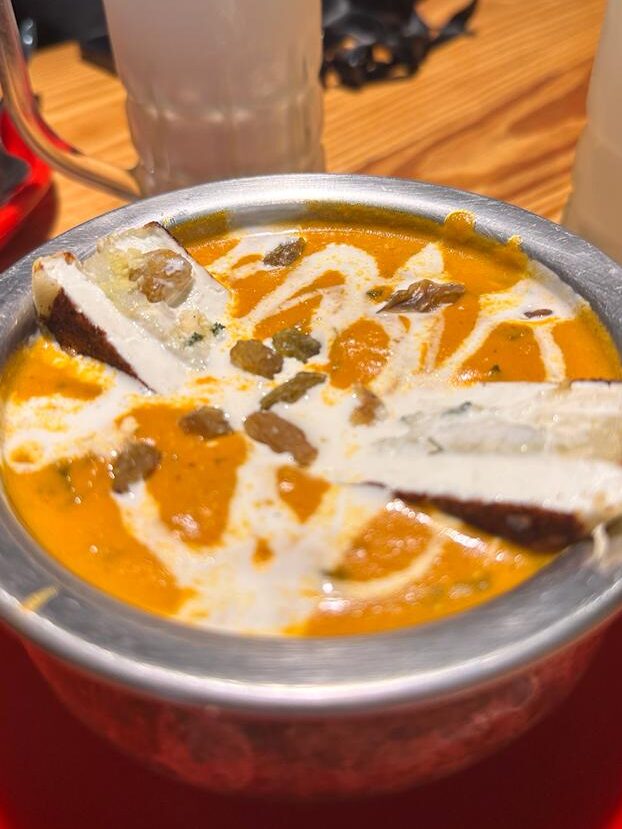
Dal – split pulses or lentils in gravy
Dal, a staple in Indian households, refers to dried lentils, peas, or beans that are cooked into a hearty, flavorful stew. It is a comforting dish enjoyed across the country, with variations showcasing regional flavors.
Whether it’s the creamy and buttery dal makhani from the North, the tadka-infused dal fry with cumin and mustard seeds, or the spiced red lentils of masoor dal, each version of dal brings a unique taste to the table.
- Dal Makhani: Delight in the richness of slow-cooked black lentils and kidney beans in a creamy tomato-based curry.
- Dal Tadka: Tempered yellow lentils with mustard seeds, cumin, and garlic.
- Dal Fry: A comforting preparation of lentils, delicately spiced and cooked to perfection.
- Masoor Dal: Red lentils cooked with tomatoes, onions, and spices.
- Dal Palak: Nutrient-rich lentils (dal) combined with spinach (palak) in a harmonious and wholesome curry.
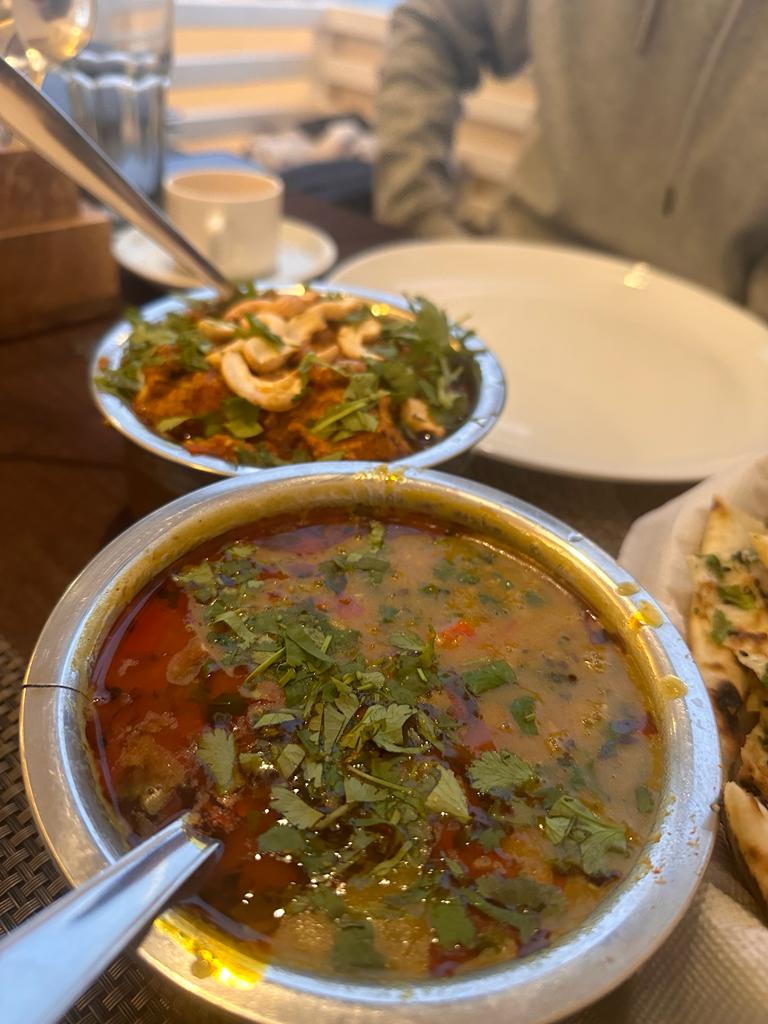
Other Curries
Indian curries, rich in spices and diverse in ingredients, offer a delightful array of tastes and textures. Whether it’s the robust tomato-based gravies like chana masala with chickpeas or the comforting coconut-infused curries like vegetable korma, each dish unveils a unique culinary tale.
Aloo gobi, a comforting blend of potatoes and cauliflower, showcases the versatility of common vegetables elevated with aromatic spices.
- Chana Masala: A spiced chickpea curry, bursting with North Indian flavors.
- Aloo Matar: Potatoes and peas unite in a spiced, homely curry
- Aloo Gobi: Harmonious blend of potatoes and cauliflower in spiced curry
- Aloo Palak: A comforting dish of potatoes (aloo) cooked with vibrant spinach (palak) in a flavorful blend of spices
- Dum Aloo: baby potatoes slow-cooked in a spiced tomato-based gravy
- Baingan Bharta: Smoky roasted eggplant shines in this flavorful curry
- Dhingri Matar: Mushrooms and peas entwined in a delectable curry
- Vegetable Kadhai: Mixed veggies dance in spiced curry in a traditional wok
- Vegetable Jalfrezi: A stir-fried medley of veggies with aromatic spices
- Bhindi Masala: Spiced okra (bhindi) delights in a flavorful curry
- Korma: Rich and creamy curry, often featuring yogurt and cream
- Malai kofta: Fried vegetable dumplings in a creamy tomato-based gravy
- Corn Palak: Sweet corn and spinach (palak) come together in a vibrant curry with aromatic spices
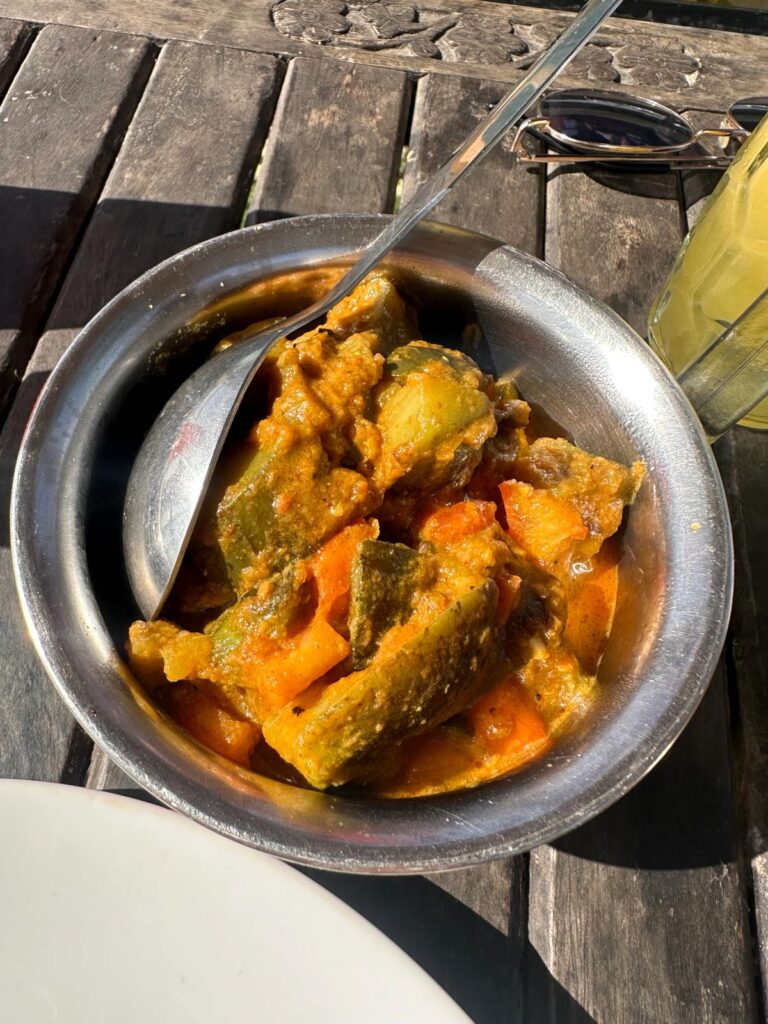
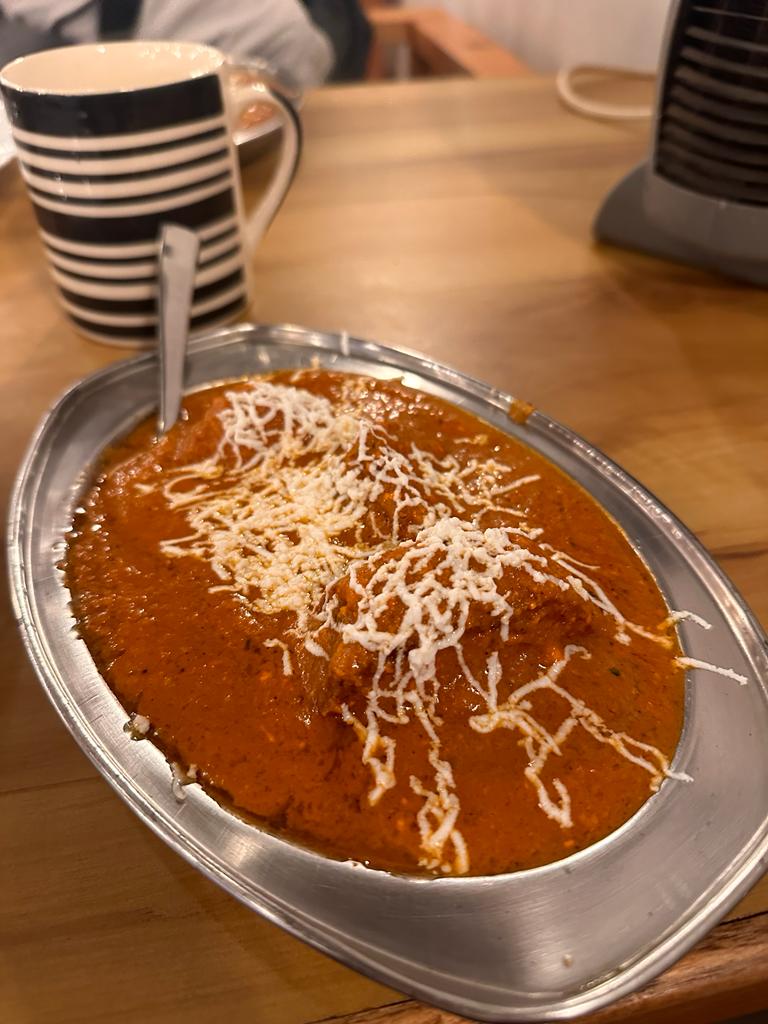
Biryani
Biryani is a special Indian dish that brings together fragrant rice, tasty spices, and your choice of meat or veggies. It’s like a flavorful melody of different ingredients layered together.
Whether it’s the rich Mughlai biryani, the tasty Hyderabadi biryani, or the colorful vegetable biryani, each type is a yummy journey through the different ways people in India love to enjoy this delightful dish.
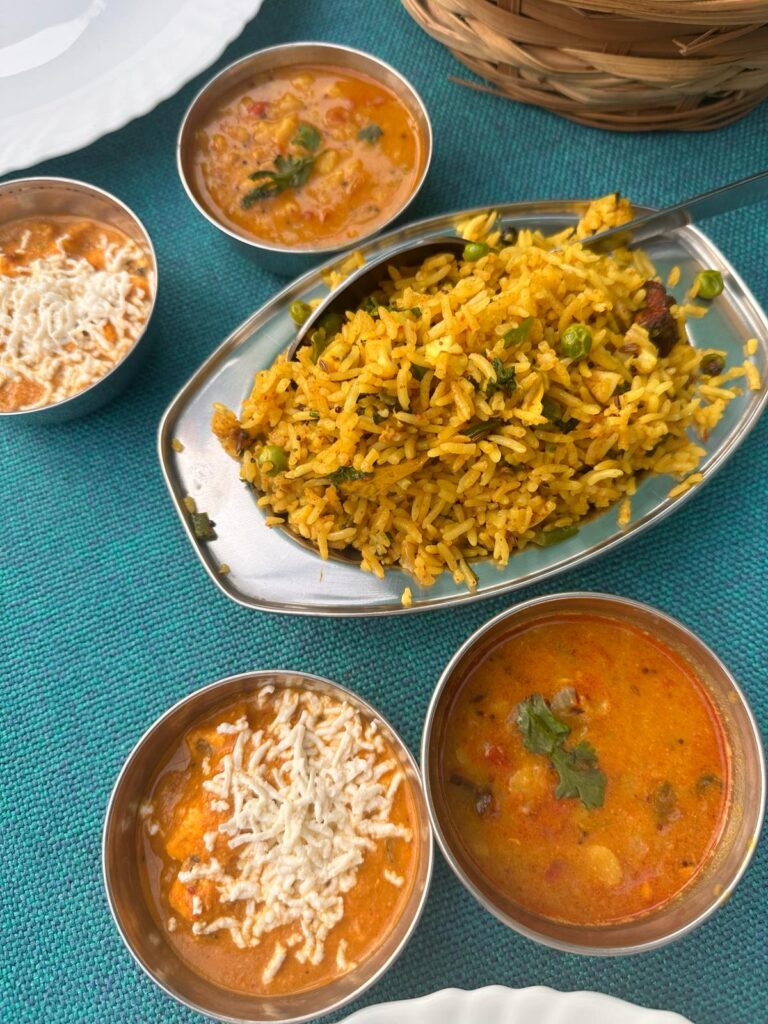
Thali
Thali is like a mini-feast served on one plate in Indian cuisine. It’s a round platter with small bowls filled with various dishes, such as curries, dal, vegetables, rice, chapati, and dessert. This way of serving allows you to enjoy a little bit of everything, savoring a diverse range of flavors and textures in one satisfying meal.
In several other places they serve Thali on banana leaves instead of bowls which you can see down below.
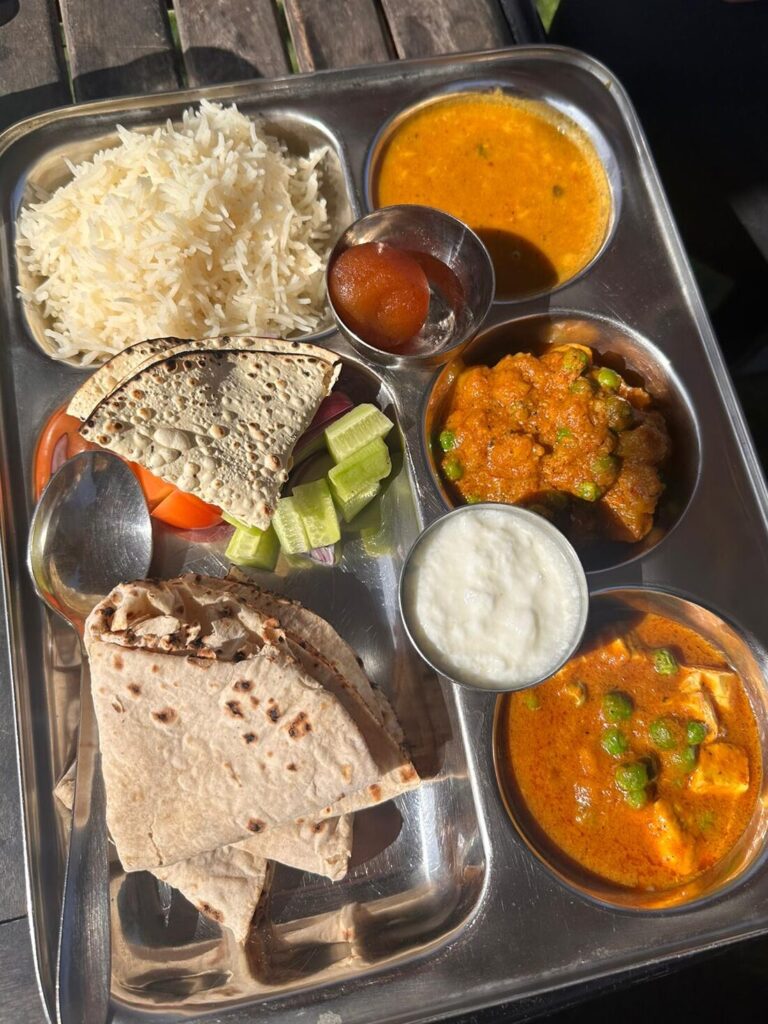
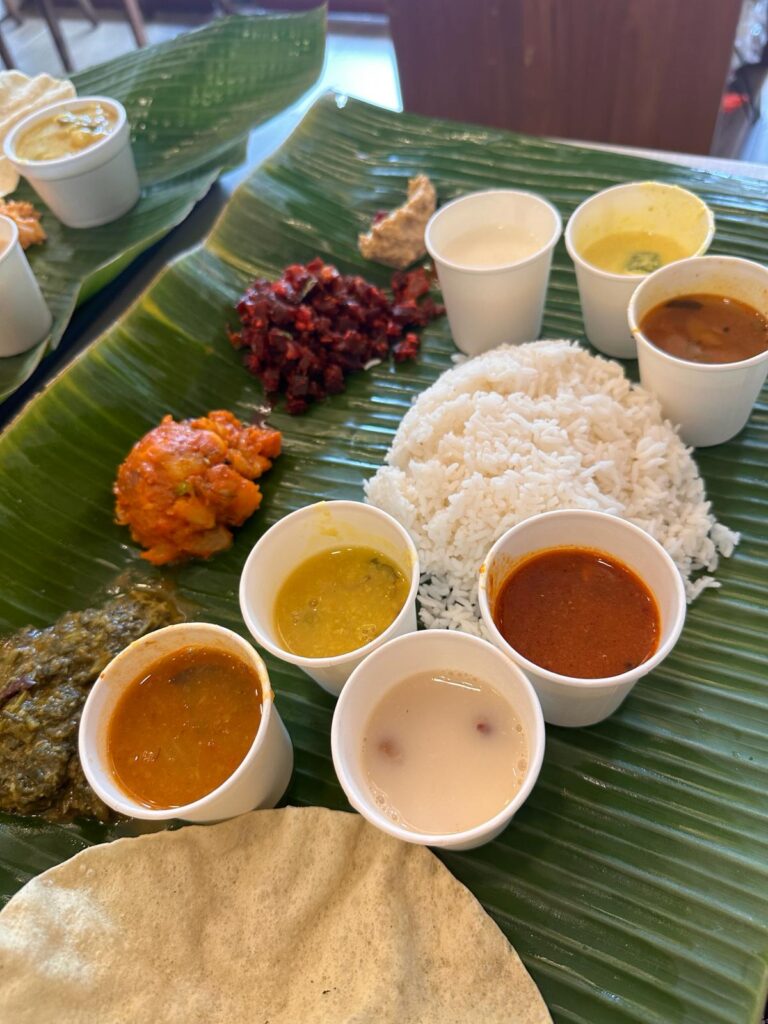
Desserts
Indian desserts are a delightful finale to any meal, offering a burst of flavors and unique combinations that awaken the taste buds. Classic treats like gulab jamun and kheer showcase the traditional sweetness of Indian food.
What makes these desserts truly fascinating are the unexpected ingredients woven into them – carrots adding a sweet crunch to gajar ka halwa, basil seeds and vermicelli creating a playful texture in the refreshing falooda, or the nutty richness of badam halwa made with ground almonds.
Each dessert is not just a sweet ending but a story of culinary creativity and cultural richness, inviting you to savor the unexpected in every bite.
Gulab jamun: Deep-fried milk dumplings soaked in sugar syrup
Kheer: Rice pudding made with milk, rice, and flavored with cardamom and saffron
Jalebi: Crispy and syrupy spiral-shaped sweet made with fermented batter
Gajar ka halwa: Rich and sweet carrot pudding made with grated carrots, milk, and sugar
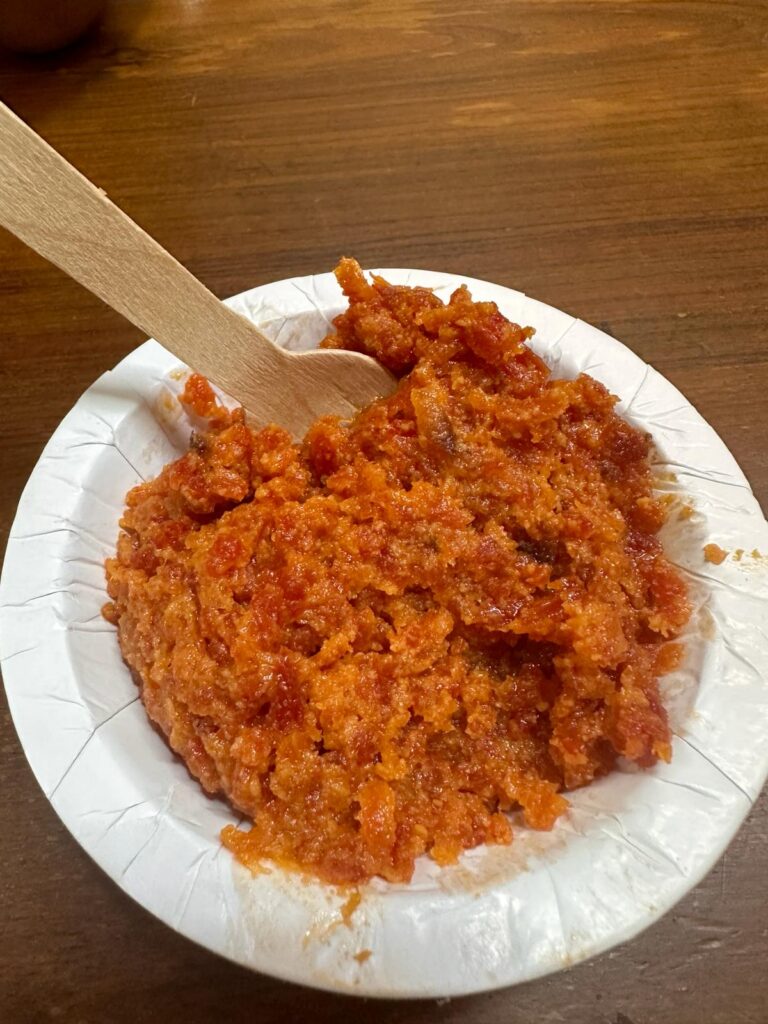
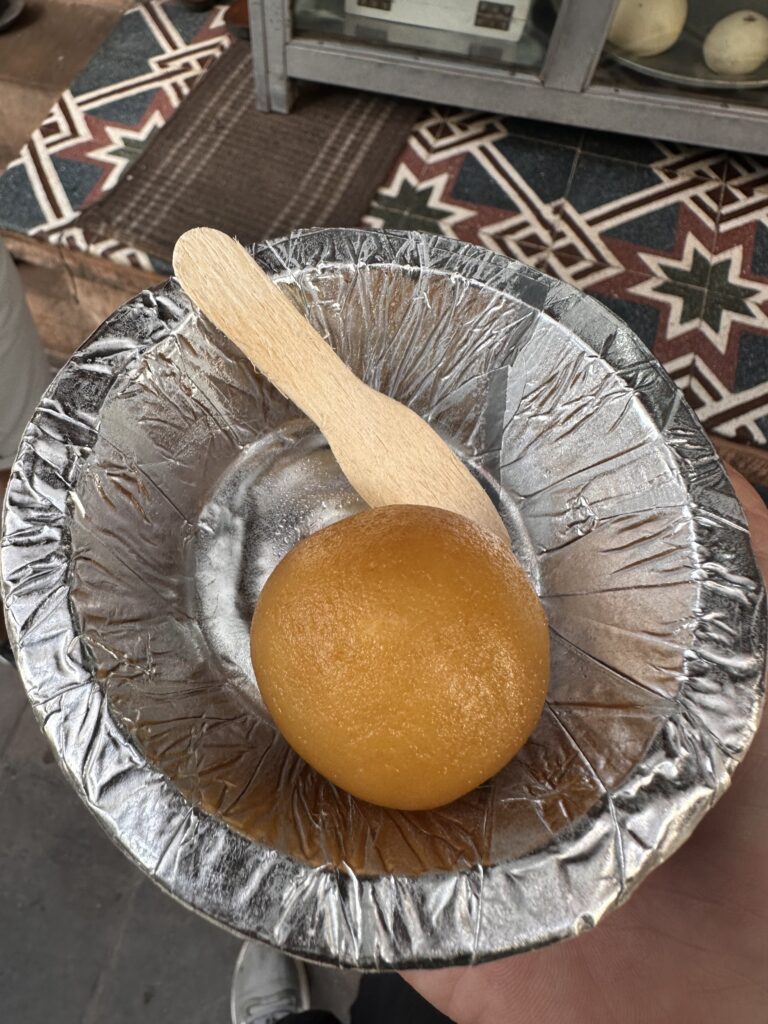
Hello to the Queen: mix of ice cream, fruits, crushed biscuits, coconut flakes and chocolate sauce, mainly found in Goa
Kulfi: creamy and dense Indian ice cream made with milk, nuts, and flavors like saffron or cardamom
Falooda: combination of vermicelli (falooda sev), sweet basil seeds (sabja seeds), rose syrup, milk and ice cream
Kulfi falooda: combination of kulfi (Indian ice cream), falooda (vermicelli), rose syrup, and nuts
Phirni: creamy rice pudding made with ground rice, milk, and flavored with cardamom and rose water
Ladoo: Sweet round-shaped balls made with various ingredients like coconut, gram flour, or semolina
Badam halwa: almond pudding made with ground almonds, ghee, and sugar
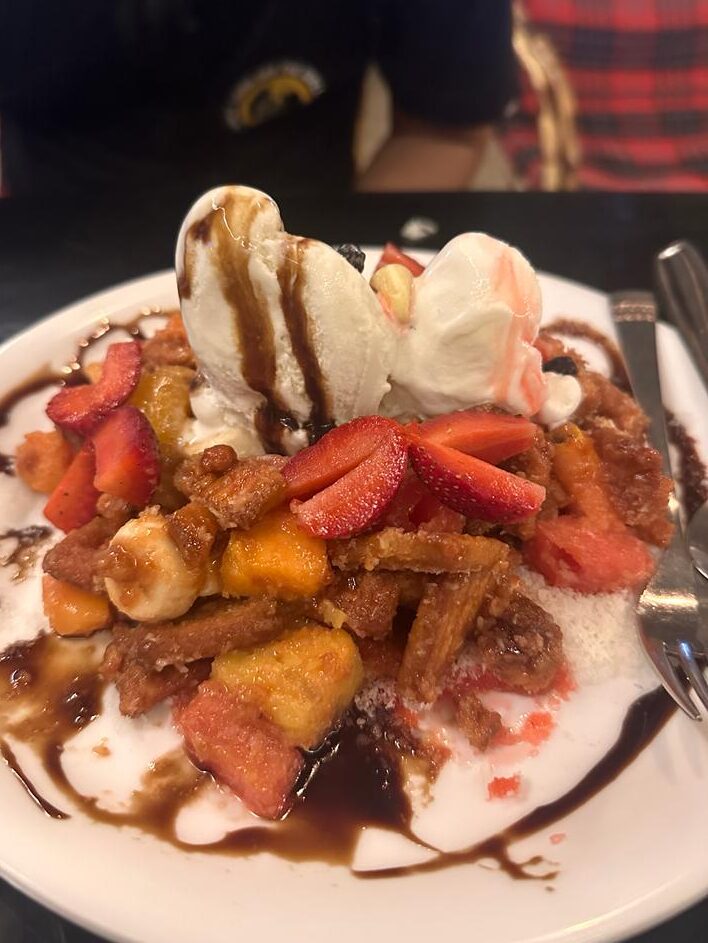
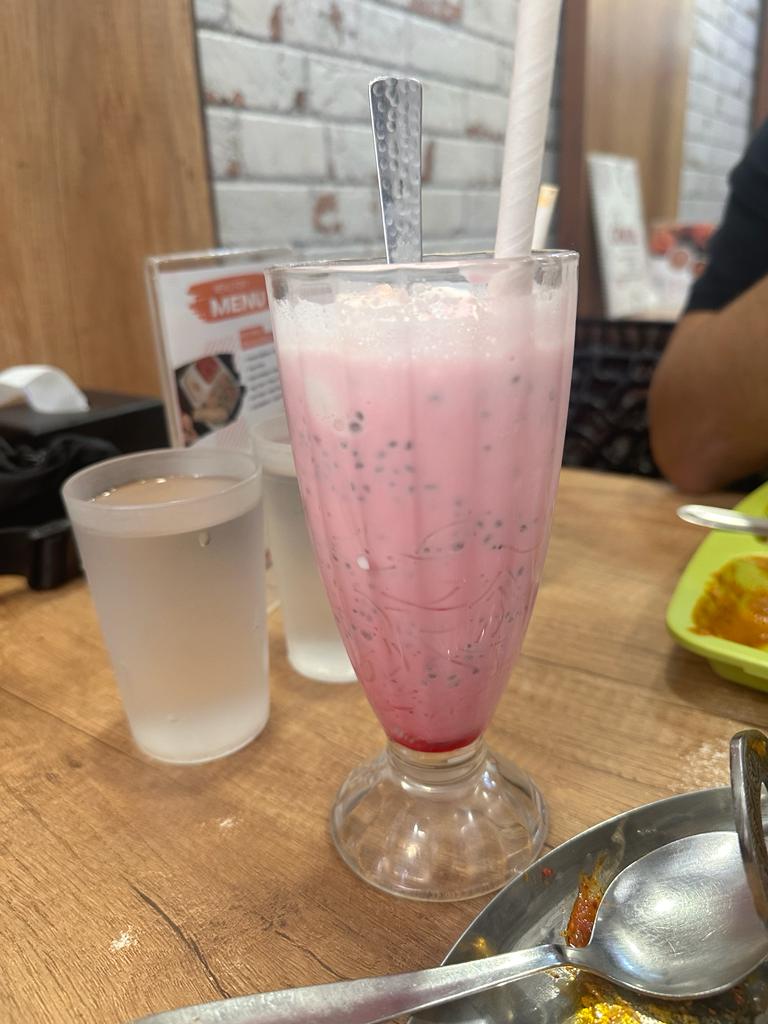
Indian Veggie Streetfood
Indian street food is a vibrant tapestry of flavors, textures, and aromas that tempts taste buds at every corner. From the beloved pani puri to the satisfying aloo chaat, the streets of India are a culinary playground.
Whether it’s the spicy kick of gol gappa, the comforting warmth of chai, or the indulgent sweetness of jalebi, street food is more than just a quick bite, it is a true journey across India.
- Papdi chaat: A popular Indian food with crispy fried dough wafers topped with yogurt, chutneys, and various toppings
- Pani Puri: snack consisting of puris filled with a mixture of tamarind water, mashed potatoes, boiled chickpeas, and chutney
- Vada Pav: A popular Mumbai street food consisting of a spicy potato fritter served in a bread roll
- Bhel Puri: A savory snack made with puffed rice, vegetables, chutneys, and crispy sev
- Kathi Roll: Paneer wrapped in a paratha with onions, chutneys, and spices
- Aloo Tikki Chaat: Potato patty topped with yogurt, chutneys, and spices
- Dabeli: A popular Gujarati street food made with spiced potato filling in a bun, topped with chutneys, peanuts, and pomegranate seeds
- Egg Roll: A Kolkata street food specialty consisting of a paratha filled with egg, vegetables, and sauces
Beverages
Indian beverages are a refreshing exploration of diverse tastes, from the tangy burst of salty lemonades to the delicate sweetness of rose syrup-infused drinks. The streets smell amazingly with the lively notes of masala chai and don’t forget to try nimbu pani, a zesty salty lemonade.
- Masala Chai: black tea with a mix of spices such as cinnamon, cardamom, ginger, and cloves.
- Lassi: yogurt-based drink made with yogurt, water, and sugar, often flavored with fruit or spices
- Thandai: drink made with milk, nuts, and a blend of spices like saffron, cardamom, and fennel seeds
- Nimbu Pani: refreshing drink made with lemon juice, water, sugar, and salt
- Jaljeera: drink made with cumin seeds, mint, and a blend of spices like black pepper, asafoetida, and dried mango powder
- Aam Panna: drink made with raw mangoes, sugar, and spices like cumin and black salt
- Rose Milk: sweet and fragrant milk-based drink made with rose syrup, milk, and sugar
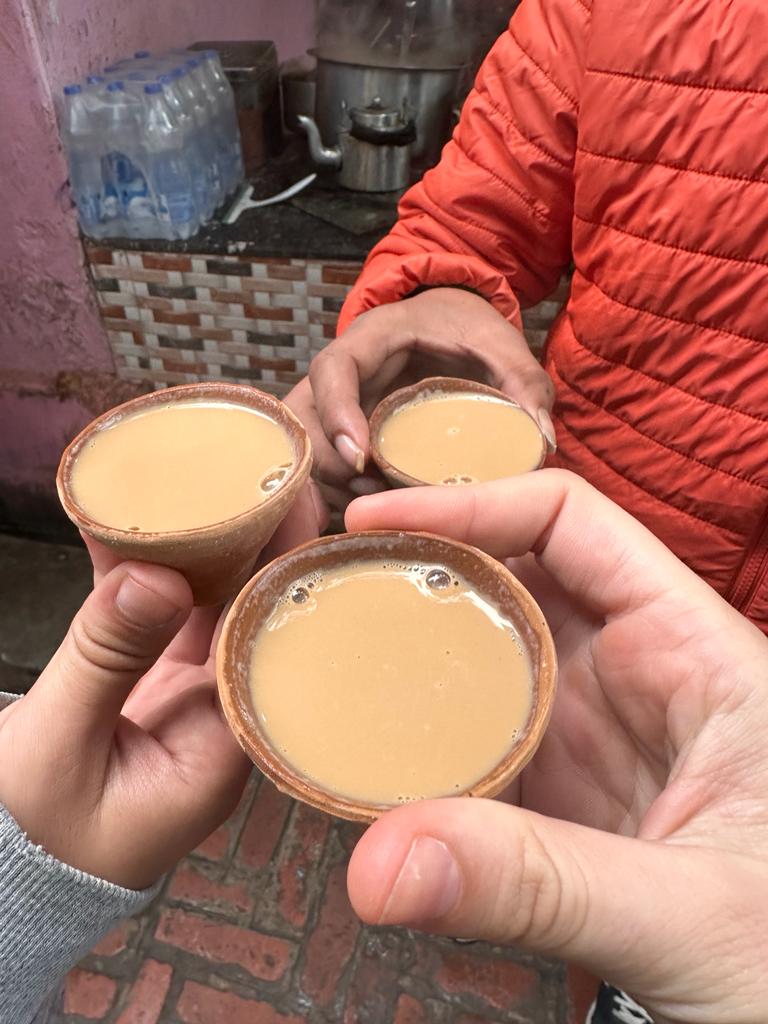
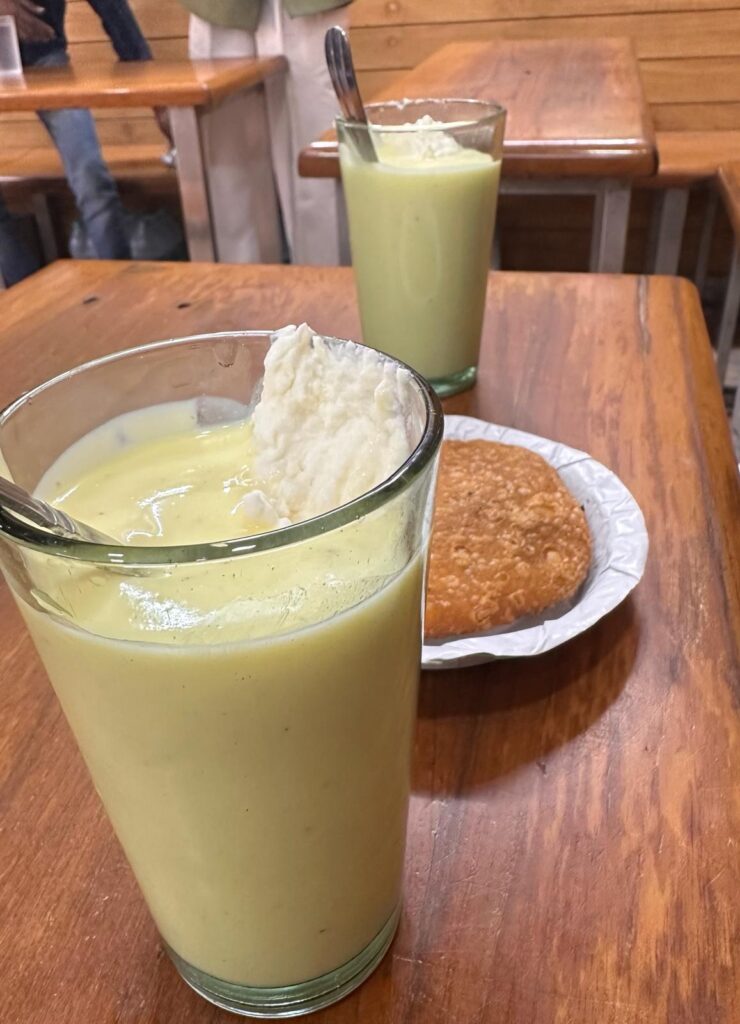
Restaurant Recommendations for Indian Veggie Food
Our month-long adventure through India wasn’t just a journey; it was a delicious expedition into the heart of its diverse and flavorful cuisine. Along the way, we stumbled upon a treasure trove of favorite eating spots, each city offering its own unique culinary gems.
From savoring Mughlai delights in Delhi and feasting on coastal flavors in Goa to indulging in iconic street food in Jodhpur, these are our favorite places to eat:
Mumbai: Namak, Rasoi Kitchen, Delhi Highway
Delhi: Raajsik, Thyme Restaurant – The Umrao, Gulati Restaurant
Jaipur: The Royal Root, Karma Haveli, Govindam Retreat
Udaipur: Harigarh, Khamma Gani, Dhabalogy
Jodhpur: WelcomCafe Chinkara, Dev Kothi Rooftop Restaurant, Gopal Rooftop Restaurant
Agra: Good Vibes Café, Taj Terrace, Kebab-e-que
Varanasi: Aman-E-Khaas, Itihaas Alley Kitchen, 84 Above
North Goa: Copperleaf Povorim, Spice Mantraa Goa, Seventh Sky Rooftop Restaurant
Make sure you go on a street food tour on your travels in India and not only eat at restaurants. Check out this tour in Delhi down below!
Summary on Indian Veggie Food
As we say goodbye to the diverse and delectable world of Indian cuisine, our taste buds are left with lingering memories of spices, aromas, and the warmth of culinary discoveries. Indian food isn’t just a collection of dishes; it’s a cultural embrace, a celebration of diversity, and a testament to the art of blending flavors.
In case you will ever travel to India, I can recommend you doing a streetfood tour in Delhi or attend a cooking class.
We did both and really enjoyed these experiences. Traveling is more than just visiting beautiful places – if you truly want to immerse yourself in local culture, you should always go for the local food!
Do not forget to follow me on my socials and stay updated on our adventurous world trip and get some more travel inspiration! Also, check out other destinations that we have visited so far.
I hope to see you again soon on this blog. Do not forget to share this Indian Veggie Food guide with your friends and family too




